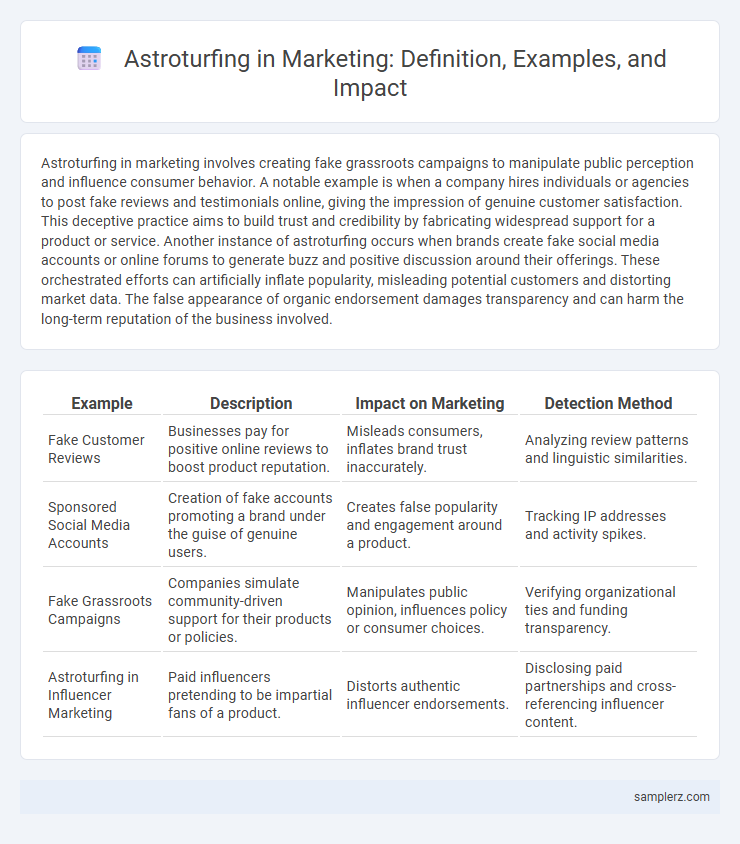Astroturfing in marketing involves creating fake grassroots campaigns to manipulate public perception and influence consumer behavior. A notable example is when a company hires individuals or agencies to post fake reviews and testimonials online, giving the impression of genuine customer satisfaction. This deceptive practice aims to build trust and credibility by fabricating widespread support for a product or service. Another instance of astroturfing occurs when brands create fake social media accounts or online forums to generate buzz and positive discussion around their offerings. These orchestrated efforts can artificially inflate popularity, misleading potential customers and distorting market data. The false appearance of organic endorsement damages transparency and can harm the long-term reputation of the business involved.
Table of Comparison
| Example | Description | Impact on Marketing | Detection Method |
|---|---|---|---|
| Fake Customer Reviews | Businesses pay for positive online reviews to boost product reputation. | Misleads consumers, inflates brand trust inaccurately. | Analyzing review patterns and linguistic similarities. |
| Sponsored Social Media Accounts | Creation of fake accounts promoting a brand under the guise of genuine users. | Creates false popularity and engagement around a product. | Tracking IP addresses and activity spikes. |
| Fake Grassroots Campaigns | Companies simulate community-driven support for their products or policies. | Manipulates public opinion, influences policy or consumer choices. | Verifying organizational ties and funding transparency. |
| Astroturfing in Influencer Marketing | Paid influencers pretending to be impartial fans of a product. | Distorts authentic influencer endorsements. | Disclosing paid partnerships and cross-referencing influencer content. |
Understanding Astroturfing: Definition and Overview
Astroturfing in marketing involves the deceptive practice of creating fake grassroots campaigns to manipulate public opinion or consumer behavior, often masquerading as genuine customer endorsements. This tactic undermines trust by fabricating authenticity, using fake reviews, staged testimonials, or bot-generated social media activity to influence target audiences. Understanding astroturfing requires recognizing its impact on brand reputation, regulatory scrutiny, and the ethical implications within digital marketing strategies.
Famous Astroturfing Scandals in Marketing
Famous astroturfing scandals in marketing include the 2012 case where Volkswagen employees posed as independent reviewers to praise the brand, misleading consumers and damaging trust. Another notable example is the 2014 Samsung campaign, where fake social media accounts were created to promote Galaxy products while disparaging competitors. These scandals highlight the risks of deceptive grassroots marketing tactics undermining brand credibility and regulatory compliance.
Case Study: Astroturfing in the Tech Industry
Astroturfing in the tech industry is exemplified by the case of a major smartphone manufacturer orchestrating fake user reviews to boost product reputation. This covert marketing strategy involved hiring third-party firms to generate thousands of positive testimonials across social media and e-commerce platforms, misleading consumers about product quality. The fallout included regulatory fines and significant damage to brand trust, demonstrating the ethical risks and business consequences of deceptive marketing practices.
Astroturfing Tactics Used by Major Brands
Major brands have employed astroturfing tactics by creating fake positive reviews and orchestrating deceptive grassroots campaigns to manipulate public perception. These companies often use bots or paid individuals to generate false social media support and fabricate consumer testimonials. Such strategic deception erodes genuine consumer trust and distorts market competition.
Impact of Astroturfing on Consumer Trust
Astroturfing in marketing, such as fake online reviews or manufactured grassroots campaigns, severely undermines consumer trust by creating a false impression of genuine support or satisfaction. When consumers discover these deceptive practices, brand credibility plummets, often leading to negative word-of-mouth and decreased customer loyalty. The long-term impact results in heightened skepticism toward all marketing messages, damaging industry-wide reputations.
Social Media Astroturfing: Examples and Consequences
Social media astroturfing involves fake online grassroots campaigns designed to manipulate public opinion by creating the illusion of widespread support or opposition, often seen in marketing to boost product visibility or discredit competitors. Notable examples include fake reviews, orchestrated viral posts, and fake influencer endorsements on platforms like Facebook, Twitter, and Instagram, which can distort consumer perceptions and damage brand trust. Consequences include potential legal actions under consumer protection laws, decreased brand credibility, and long-term consumer skepticism toward genuine marketing efforts.
Astroturfing in Online Reviews: Real-World Instances
Astroturfing in online reviews is prevalent in industries such as technology and hospitality, where companies post fake positive feedback to manipulate consumer perception. For example, certain smartphone brands have been exposed creating thousands of fabricated five-star reviews to boost product rankings on platforms like Amazon. Restaurants and hotels have similarly faced backlash for orchestrating fake review campaigns on TripAdvisor to artificially enhance their reputations and increase bookings.
Regulatory Actions Against Astroturfing Practices
Regulatory actions against astroturfing in marketing have intensified as authorities uncover fake grassroots campaigns designed to manipulate consumer opinions. The Federal Trade Commission (FTC) has imposed significant fines on companies that create deceptive online reviews and fake endorsements, emphasizing transparency requirements. These enforcement efforts aim to protect consumers by promoting honesty in advertising and deterring unethical practices in digital marketing.
How to Spot Astroturfing in Marketing Campaigns
Astroturfing in marketing campaigns often involves fake grassroots support crafted by companies or interest groups to manipulate public perception. Key indicators include overly generic or overly positive reviews posted in a short timeframe, repetitive language across multiple accounts, and lack of detailed personal experiences. Monitoring inconsistencies in user profiles, suspicious timing of posts, and an unusually high volume of promotions without credible sources helps identify astroturfing efforts.
Ethical Marketing: Avoiding Astroturfing Pitfalls
Astroturfing in marketing involves creating fake grassroots campaigns to mislead consumers, exemplified by companies hiring individuals to post positive but inauthentic reviews online. Ethical marketing demands transparency and authenticity, as deceptive practices undermine brand trust and violate consumer rights. Avoiding astroturfing preserves brand integrity and fosters genuine customer relationships essential for long-term success.

example of astroturfing in marketing Infographic
 samplerz.com
samplerz.com